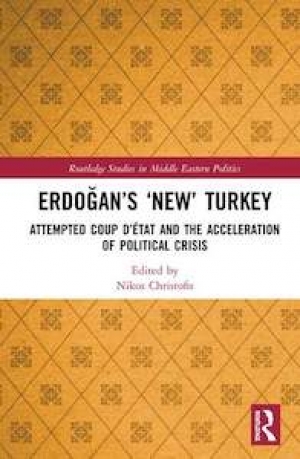The 2016 failed military coup is considered the latest attempt in Turkish history to reverse or course-correct the political and ideological trajectory of the country, as defined by the secular tenets of the most prominent figure in Turkish politics during the twentieth century, Mustafa Kemal Ataturk. Previous successful overthrow attempts – in 1960, 1971, 1980 and 1997 – occurred usually once every decade with the 2000s being the exception. Whereas the 1997 ‘post-modern coup’ was considered to have served as a cap to Turkey’s military coup history, and with the country’s European integration process acting as a buffer against coup nostalgia, the 2016 overthrow attempt reignited the Turkish past memory in this regard. As Turkish history currently stands, it certainly seems that the 2000 decade was more likely the exception that confirmed the rule.
Nikos Christofis’ introduction serves as a detailed examination of the main developments in recent Turkish political history through the prism of the rise of Kemalism and Erdoğanism as the country’s driving ideologies, as well as of the evolution of AKP rule within the first two decades of the twenty-first century. The following chapters operate as an analysis and synthesis on post-coup Turkey on two distinct axes: the first focuses on the political, religious and societal factors before and after the 2016 event; the second reflects on the implications and consequences of the failed coup both on its domestic and foreign policy aspects, as well as on the complexities with regards to international reaction and state-society relations.
As such, on the one hand, the first section places emphasis on the ‘syntaxes of power’ and the promotion of a country at war within Turkish political life, the influence of the directorate of religious affairs and the impact of its network during and after the coup attempt, the societal repercussions with regards to the state of emergency and the significance of the watch rallies, the AKP-Gülen relationship in Turkish politics during the previous decades, the transition to the new Presidential political system and its reinforced executive powers, as well as the emergence of civil martyrdom during the 2010 decade.
Moreover, on the other hand, the second section shines a light on societal anxiety and the politics of denial developing as an aftereffect to the failed coup, the absence of a successful counter-narrative within the Turkish political spectrum able to be offered as an alternative to the present one, the impact and the reaction to the Gezi Park demonstrations by both the ruling party and international observers, the many effects regarding the re-emergence of the Kurdish question in political as well as security-related terms.
The chapter titled ‘The AKP rule and the directorate of religious affairs’ is of particular interest since it clearly articulates the hold that the Justice and Development Party has on the majority of the population through the vast and heavily state sponsored Diyanet network. As the author notes, however, the rise of the directorate of religious affairs originates back to the latter half of the twentieth century and the previous Kemalist regimes, as a means to obtain majority approval. Nonetheless, with regards to the failed coup, the author demonstrates the added value of the Diyanet in promoting the image of Erdoğan, as well as in organizing Sunni Muslim religious followers against a common enemy or a crisis.
There is still much debate in various fora with regards to the ‘controlled coup’ rumors of the July 2016 event. Whereas these conspiracy-related narratives stay in vogue, the ramifications of the failed coup remain the same, regardless of claims of ‘state sponsorship’. The volume is an eloquent, balanced and scholarly account of Turkish political narratives and its fluctuations. It offers much needed food for thought and opens up an array of analytical ways for those who wish to gain an accurate and deep understanding of Turkish politics and to examine the ‘second war of independence’ as proclaimed by President Erdoğan himself and its impact on Turkish political and societal life. This seems to be the next logical instalment in the study of the AKP’s stay in power and its recalibration of Turkey’s domestic and foreign policies since 2002.






